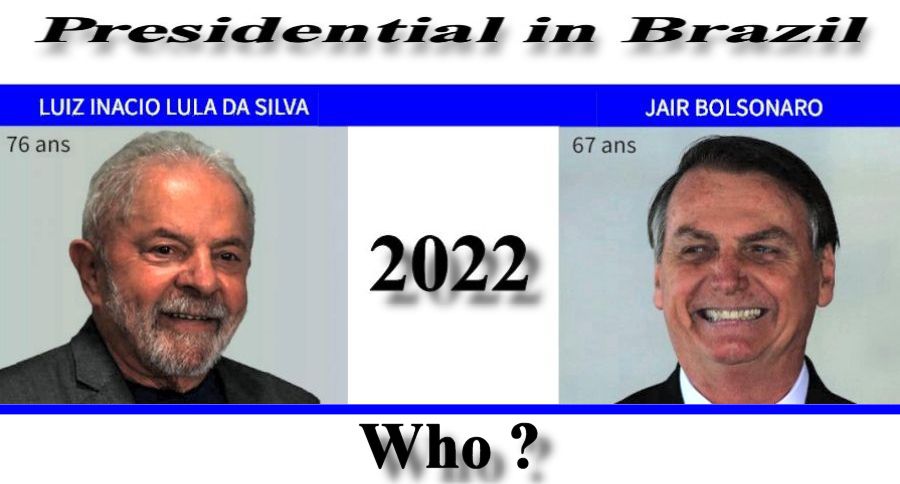PRESIDENTIAL IN BRAZILFAVORABLE DYNAMICS FOR JAIR BOLSONARO | |
Bolsonaro is on the heels of Lula, a second round on October 30 If former President Lula came out on top in the first round of the presidential election, outgoing President Jair Bolsonaro held up much better than expected. Luiz Inacio Lula da Silva, icon of the Brazilian left, certainly won 48.4% of the vote, ahead of the president, at 43.20%, but this narrow victory is most disappointing for Lula, to whom the polls promised a large lead, even a triumph from the first round. Five points therefore separate the two candidates, while for months polls predicted a gap of at least 15 points between the former left-wing president and the far-right president. The outgoing president obtained his best scores in the central-western, southern and south-eastern regions, notes the Brazilian newspaper Folha de São Paulo. In the state of Roraima, in the northwest of the country, Jair Bolsonaro won 69.6% of the vote. Bolsonaro is quite strong in the south of the country, a white region that is the heart of Brazil's rurality, with large conservative farmers. The good scores of the president-candidate are found in São Paulo, the economic heart of Brazil, as well as in Rio de Janeiro. With 43% of the vote, Jair Bolsonaro improves his score for 2018 entering the second round in a favorable dynamic: he can indeed envisage victory if he manages to mobilize some of the voters who voted for Simone Tebet, the center candidate. right who won 4.16% of the vote, or for Ciro Gomes (center left, 3.04% of the vote) and a fraction of the 20.9% of Brazilians who did not vote this Sunday. As for Jair Bolsonaro, the former left-wing president “made it strong where he had to do it strong”, that is in the Nordeste region, which is poorer and more rural. Lula achieves his best score (74.2%) in the state of Piauí, notes the Brazilian newspaper Folha de Sao Paulo. With 48% of the vote, Lula seems to have had his fill of votes even if he will try to rally those voters who will tip the balance one way or the other. He will therefore have to face his sworn enemy in a second round, provided for by electoral law on October 30. A Bolsonarist tidal wave in legislative and governmental elections This result completely reshuffles the cards of this closely scrutinized presidential election. Indeed, the outgoing president also records much better results than predicted by the polls for the other polls of the day: those which renew the two chambers of Congress and elect the governors of the 27 Brazilian states. According to analysts, the Liberal Party (PL), party of the current far-right president, is on track to obtain the largest number of seats in the Chamber of Deputies. In the Senate, the PL and its allies won at least 14 of the 27 seats to be filled. Regarding the governors, the Liberal Party candidate Claudio Castro was re-elected governor of the state of Rio in the first round. The biggest surprise, however, was the arrival in the lead of Tarcisio Freitas in the state of São Paulo, former Minister of Infrastructure of Jair Bolsonaro, who will face Fernando Haddad, dolphin of Lula and former mayor of the megalopolis of São Paulo . Lula's Workers' Party was nevertheless announced as leading in the polls in Brazil's most populous state. At the national level as well as at the local level, the electoral dynamic seems more favorable to Jair Bolsonaro than to the camp of the Workers' Party and its allies. A fierce campaign for the second round This narrow victory for Lula in the first round of the presidential election is the omen of a month of fierce campaigning until October 30, the date of the second round of elections. Sunday evening, the two candidates who came out on top reacted to the results. “As of tomorrow, we will already be in the countryside. Do not rest, ”tweeted leftist leader Lula in the evening. "It's just an extension. I can tell you that we are going to win this election (...) The fight continues, until the final victory”, declared Lula. The former president, addressing his supporters on Paulista Avenue in São Paulo, declared himself "absolutely certain that divine justice will allow us to win these elections, to recover the dignity of the Brazilian people". And the candidate to add: “It is as if fate liked me to work a little more. » The outgoing president declared himself optimistic to "play the second half" of the presidential election. “Our opponents only prepared for a 100 meter race. We are ready for a marathon. We will fight with confidence and with growing strength, certain that we will win for the homeland, for the family, for life, for freedom and for the will of God! Jair Bolsonaro. He also pledged on Sunday evening to better convince the most disadvantaged Brazilians that they would benefit more from his program. “I understand that there have been a lot of votes related to the living conditions of Brazilians, who are affected by inflation, especially basic necessities. I understand that many people crave change but sometimes some change can be for the worse,” he said. If the former left-wing president and the current far-right president agree on the need for Brazil to be “saved”, then Brazil is facing a serious economic crisis. Of the country's 213 million inhabitants, 33 million suffer from hunger and 9.9 million are unemployed. Inflation is also very high and reaches 12%. To deal with this situation, the candidate of the Workers' Party, Lula, first wishes to improve the purchasing power of the poorest Brazilians by strengthening the current "Auxilio Brasil" system which grants 600 reais (115 euros) to poor families. Lula also wants an overhaul of the Brazilian tax system, in order to tax the middle classes more gradually and the wealthiest households more. For his part, Jair Bolsonaro is betting on employment to revive the country's economy. Unlike his left-wing rival, he positions himself in favor of the privatization of large public companies, such as the electricity manager. According to him, the economic freedom of enterprises is the key to social well-being. |
|
| Garett Skyport for DayNewsWorld | |
 |
|




